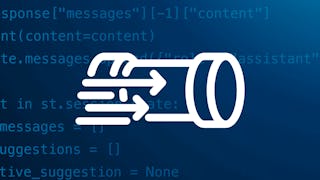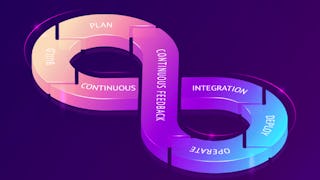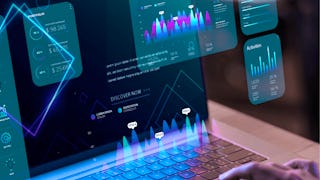Filter by
SubjectRequired
LanguageRequired
The language used throughout the course, in both instruction and assessments.
Learning ProductRequired
LevelRequired
DurationRequired
SkillsRequired
SubtitlesRequired
EducatorRequired
Explore the Computational Science Course Catalog
 Status: New
Status: NewSimplilearn
Skills you'll gain: Generative AI, Software Development Tools, Code Review, Application Development, Prompt Engineering, Maintainability, Software Quality (SQA/SQC), Artificial Intelligence, Debugging
 Status: NewStatus: Free Trial
Status: NewStatus: Free TrialSkills you'll gain: Database Management, Databases, Data Pipelines, DevOps, CI/CD, Command-Line Interface, Version Control, System Monitoring, Continuous Monitoring
 Status: NewStatus: Free Trial
Status: NewStatus: Free TrialSkills you'll gain: CI/CD, Authorization (Computing), Package and Software Management, Infrastructure as Code (IaC), Azure DevOps, Continuous Delivery, Authentications, Application Deployment, Continuous Integration, DevSecOps, DevOps, Security Controls, Continuous Deployment, Git (Version Control System), Performance Tuning, Agile Methodology, Identity and Access Management, Version Control, Microsoft Azure, Collaborative Software
 Status: New
Status: NewCoursera Instructor Network
Skills you'll gain: Web Content Accessibility Guidelines, Compliance Auditing, Compliance Management, Regulatory Compliance, Usability, Web Design, User Interface (UI), Digital Content, Automation, Test Tools, Stakeholder Communications, Prioritization
 Status: New
Status: NewSkills you'll gain: Power BI, Data Analysis Expressions (DAX), Data Pipelines, Data Transformation, Data Analysis, Microsoft Azure, Analytics, Data Warehousing, Data Integration, Data Processing, Data Cleansing, Data Modeling, Dashboard, Data Governance
 Status: New
Status: NewGoogle Cloud
Skills you'll gain: Flutter (Software), Generative AI Agents, Generative AI, Mobile Development, Google Cloud Platform, Application Development, Artificial Intelligence, Artificial Intelligence and Machine Learning (AI/ML)
 Status: New
Status: NewSkills you'll gain: Object Oriented Programming (OOP), C++ (Programming Language), Computer Programming, Embedded Software, Integrated Development Environments, Embedded Systems, Game Design, Web Development
 Status: New
Status: NewSkills you'll gain: Prompt Engineering, Large Language Modeling, ChatGPT, OpenAI, Generative AI, Microsoft Azure, Microsoft Development Tools, Artificial Intelligence, Business Logic, Application Development, Persona (User Experience), Full-Stack Web Development, Automation
 Status: New
Status: NewCoursera Instructor Network
Skills you'll gain: Account Management, Client Services, AI Personalization, Customer Engagement, Generative AI Agents, Customer Communications Management, Personalized Service, Customer Insights, Prompt Engineering, Communication, ChatGPT, Scalability, HubSpot CRM, Predictive Modeling, Business Process Automation, Business Ethics, Workflow Management, Automation
 Status: New
Status: NewGoogle Cloud
Skills you'll gain: Generative AI, Cloud Applications, Large Language Modeling, Google Cloud Platform, Prompt Engineering, Application Development, Application Deployment, Natural Language Processing, Cloud Computing Architecture, Prototyping, Solution Architecture
 Status: NewStatus: Free Trial
Status: NewStatus: Free TrialSkills you'll gain: Generative AI, Large Language Modeling, Natural Language Processing, Unstructured Data, Artificial Intelligence, Application Development, Data Pipelines, User Interface (UI), Data Processing, SQL, Query Languages
 Status: New
Status: NewSkills you'll gain: Flutter (Software), Generative AI, Generative AI Agents, Google Cloud Platform, Mobile Development, Application Development, Artificial Intelligence
Computational Science learners also search
In summary, here are 10 of our most popular computational science courses
- Generative AI Course in Software Building: Simplilearn
- Advanced Data Engineering with Snowflake: Snowflake
- Exam Prep AZ-400: Microsoft DevOps Engineer Expert: Whizlabs
- WCAG Compliance: Web Accessibility Best Practices: Coursera Instructor Network
- Getting Started with Microsoft Fabric: Whizlabs
- 使用 Vertex AI 和 Flutter 构建生成式 AI 智能体: Google Cloud
- Introduction to Object-Oriented Programming with Arduino : Packt
- Semantic Kernel SDK for Intelligent Applications : Packt
- GenAI for Account Managers: Personalizing Client Engagement: Coursera Instructor Network
- Como criar apps de IA generativa no Google Cloud: Google Cloud










